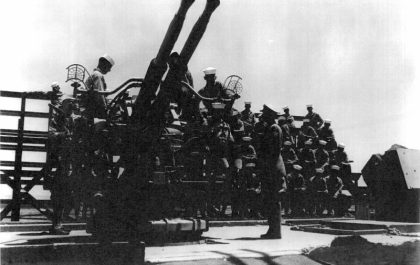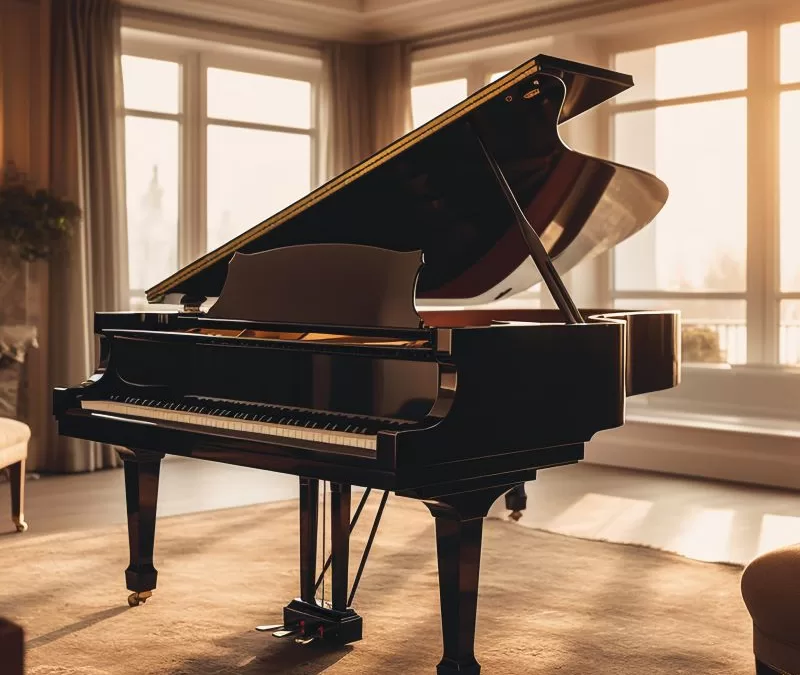
For the second time that year I felt cut adrift. The war was pulling away everyone I cared about. My father was serving in the Pacific; my friend Kitty and her whole family were ripped out of their lives and sent to a camp at Manzanar; my sister was on her way to serve in the Women’s Army Corps.
Kitty’s little dog Yuki was a big comfort to me. Taking care of him was the one thing I could do for my absent friend, but his presence was also a lifeline for me at a time when the ground felt like it was crumbling under my feet. Yuki went everywhere with me on the ranch, and sat on my feet when I did my homework. He was always waiting for me at the door when I came home.
School helped, too. We were so busy with end of year projects and tests and things there wasn’t much time for anything else, but then school was out. Jessie and I would both be going to the Junior High School in September—another change.
News of the Japanese attack on Midway Atoll came during the first week of summer vacation. I felt another weight of dread. My father had been assigned to be the surgeon—that’s what the Navy calls doctors—on a ship, but I I didn’t know which one or even what kind. Was he there for that terrible battle? All we knew is that a lot of men died. The US lost an aircraft carrier—the USS Yorktown—with one hundred and forty-four men on board. Our fighter pilots took out four enemy carriers but there were a lot of deaths. I stayed close to the radio listening for updates. I was afraid to miss even one.
You might think June in California would be a picture postcard of life at the beach, but the month started out cold and gray. It matched my mood. Aunt Maddie understood. Jessie didn’t. I couldn’t explain to her how I felt, so I just kept away. I wrote letters to Kitty and my sister. I wrote to my Father, too, pouring out all of my fears, but without the hope of hearing back any time soon. I didn’t hear back from him, but Ally wrote right way. It turned out it wasn’t so easy for a WAC to go to war. The Army didn’t seem to know what to do with the newly created Women’s Army Corps volunteers. Instead of going to Hawaii, and the war in the Pacific, Ally was being sent to Dayton, Ohio for training, and even then it wasn’t clear when she or any of the others would be cleared to go into the field.
“I might just as well have stayed in school,” she wrote. “Let that be a lesson, James, the one about looking before leaping and not jumping the gun.”
Ally might be disappointed not to be headed to the front, but at least she was safe. I couldn’t stop worrying about my father. I haunted the postbox. I was there every morning to meet the mailman, and dashed out every time I thought I heard his truck during the day.
I often stopped to say hello to Mr Zelle on my way to and from the mailbox. He was still working on his old steam-powered motorcar in his spare time. Finding replacements for some of the missing parts was difficult, and more and more old cars were ending up as scrap for the war effort, but Mr Zelle was really good at improvising. He had found an old Renault motor and was in the process of installing it. I helped him with the car almost every Sunday. He didn’t mind if I wasn’t feeling talkative. He wasn’t talkative most of the time, either, but I think my obsession with the mail began to worry him.
On about my twentieth trip back from the mailbox he stopped me. “Come have a cup of coffee with me, James,” he said. “Come in and sit.”
I’d never been inside his house. It was one of two adobe buildings on the ranch. The Calzadas lived in the bigger cottage. This one had the same thick mud brick walls, but it had just two rooms downstairs: a kitchen and a living room that was dominated by a grand piano. Like the main house, the walls of the cottage were lined with bookcases, but these shelves held music manuscripts as well as books. There wasn’t much furniture, just a couple of comfortable chairs that faced the fireplace, and a kitchen table that looked like it doubled as Mr Zelle’s desk. It was piled with sheafs of music paper covered in symbols that looked like swarms of tadpoles. The piano was like having an elephant, or maybe the throne of a grand king in the middle of the small room. Unlike the table, the piano’s polished wooden surface was bare and as shiny as a mirror. A lectern next to the keyboard held music paper, pens, pencils, a metronome and a framed photograph of a woman holding a baby.
I often heard the sound of that piano, thundering like a storm or sending out a shower of notes like gentle rain or the sound of birds, but I’d never seen it before. It fascinated me, black and shiny and mute, but with the power to transform ideas into music.
Mr Zelle pushed aside the papers to make room for me at the kitchen table and put the kettle on the stove.
“It is hard to wait for news, James,” he said, as he made the coffee. “I know that. When the war started I was in America on a teaching fellowship, but my wife and our son were still at our home in Innsbruck, in Austria. My wife took our son and fled across the border into Switzerland when it was no longer safe for her in Austria, but I could do nothing. I could only wait and hope. If I returned I would be imprisoned.”
“But why?”
“Because of our religion and because of my music,” he said. “It is not the music or the philosophy of music that is approved of in modern Germany. And anything the Nazis do not like they want to destroy. There are many refugees from Germany and Austria here in Los Angeles. You have heard, perhaps, of the writer Thomas Mann? He is here in Pacific Palisades. So is the great composer Arnold Schoenberg, and many others. I am not important like they are, but I was also blessed to find friends here and to be able to stay. I never met your aunt before, but she offered this cottage to me, a stranger.”
“I never met her before I came to stay here, either,” I confessed. “Well, just when I was a baby, and I don’t remember that. When did you know your wife and son were safe?”
“Sophie, my wife, was able to send me a message. She crossed the border on foot. Refugees have not had it easy even in Switzerland, which has so far been able to stay out of the war. Fortunately for us, she has family there and was given permission to stay. She is as safe as anyone can be during these terrible times, but still I worry about her every minute of every day. How can I not? And yet, I am one of the lucky ones. I know they are safe. For now, at least.”
“I didn’t know that,” I said, feeling stupid.
“I do not talk about it,” he said. “It is too painful, but I could see you were feeling a pain like that, too.”
“How do you live with that worry?” I asked.
“I put it into my music,” Mr Zelle said. “I will not say do not worry about your father or your sister or your friend. It is impossible not to worry when the people we love are in danger, but try not to let that worry eat you. We none of us know the future. It hasn’t been written yet.”
I did still worry, and there was no word from my father, but talking to Mr Zelle helped. I continued to follow the battle of Midway in the news all week, and when there were no reports of hospital ships being torpedoed, and it became clear that the battle was a major US victory, despite heavy losses, the fear began to recede.
In late June I finally received a letter from my father. It was short. Just that he was well. I wanted to know if he’d really been at Midway, and what it was like, and what life was like on the ship, and if he missed me the way I missed him, but all he wrote was that he was glad I’d done well in school that semester. He encouraged me to take biology in the fall—it would help with my medical career. And he hoped I would try out for sports at my new school. He sent me five dollars and suggested that I buy a football and some gear to practice with over the summer.
It wasn’t much of a letter, but at least I knew he was OK, if only for the moment. And that was probably as much as anyone could hope for in wartime. I tried to visualize the future my father had always wanted for me, the one he had wanted for himself: star athlete, brilliant medical doctor, officer in the Navy. I couldn’t. That future seemed as impossible to me as the ones I’d visualized for myself as a child, when I dreamed of being an explorer, or an adventurer, or a pirate.
Another vision slipped into my thoughts, one born of my new-found love for music, and the sight of that great, black, shiny piano in Mr Zelle’s living room that had the power to transform fear and anxiety into music. I wondered how many music lessons five dollars would buy.
“We none of us know the future,” I said to myself. “And maybe it’s OK to try to make one for yourself instead of living the one other people expect you to have.”





